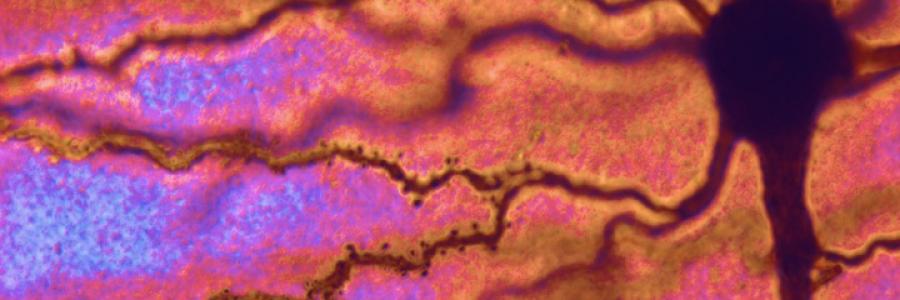
Natalia Goriounova published the association between large human pyramidal neurons that generate fast action potentials and intelligence in eLIFE
What makes some people smarter than others? We know that our brain works through the activity of its almost 100 billion brain cells that each act as a small chip: they collect, process and pass on information in the form of electrical signals. Especially in brain areas that integrate different types of information, such as frontal and temporal lobes, brain cells have bigger dendrites – long processes specialized to collect signals. Theoretical studies predict that larger dendrites help cells to initiate electrical signals faster. Because of difficult access to human living neurons it is completely unknown whether any of these cellular properties actually relate to human intelligence.
In a collaboration between basic neuroscientists at the VU Amsterdam (CNCR, Faculty of Science), neurosurgeons and clinical psychologists at Amsterdam UMC location VUmc and SEIN Heemstede, the study asked the question whether smarter brains are better equipped with faster and bigger cells. From imaging studies, we know that people with higher IQ have thicker cortex in these brain areas. But does thicker cortex also contain cells with bigger dendrites and is their function different? Our study is the first to take the single cell perspective and link cellular properties to human intelligence.
We studied 46 people who needed surgery for brain tumors or epilepsy. Each took an IQ test before the operation. To access the diseased part deep in the brain, the surgeon also removed small undamaged samples of temporal lobe. These samples still contained living cells and their electrical signals – action potentials- were measured in the lab. We found that cells from people with higher IQ have larger dendrites and faster action potentials especially during increased activity. With computational modelling we showed that neurons with larger dendrites and faster action potentials can process more information coming in and can pass more detailed information on to other neurons.
Traditionally, research on human intelligence focuses on three main strategies: brain imaging studies of brain structure and function, genetic studies to find genes associated with intelligence and behavioral psychology. Behavioral psychological studies have shown that higher IQ scores are associated with faster reaction times of subjects. Our findings provide a cellular explanation for this association and links findings from the separate approaches, explaining how identified genes for intelligence can lead to increased cortical thickness, larger neurons as well as faster reaction times in people with higher IQ. Thereby, the study connects levels of organization in the human brain from function of cells to circuits to behavior.
Faster action potentials and bigger dendrite to receive and process more synaptic information seems like a small difference between neurons. However, since our brain consists of close to 100 billion neurons, this effect rapidly multiplies to a large effect on the computational potential of the brain as a whole: ‘a small step at the level of a single neuron, a giant leap for the computational power of the brain’.
Publication in eLife:
Large and fast human pyramidal neurons associate with intelligence
Authors: Natalia A. Goriounova, Djai B. Heyer, René Wilbers, Matthijs B. Verhoog, Michele Giugliano, Christophe Verbist, Joshua Obermayer, Amber Kerkhofs, Harriët Smeding, Maaike Verberne, Sander Idema, Johannes C. Baayen, Anton W. Pieneman, Christiaan P.J. de Kock, Martin Klein, Huibert D. Mansvelder.
https://elifesciences.org/articles/41714 , Doi: 10.7554/eLife.41714